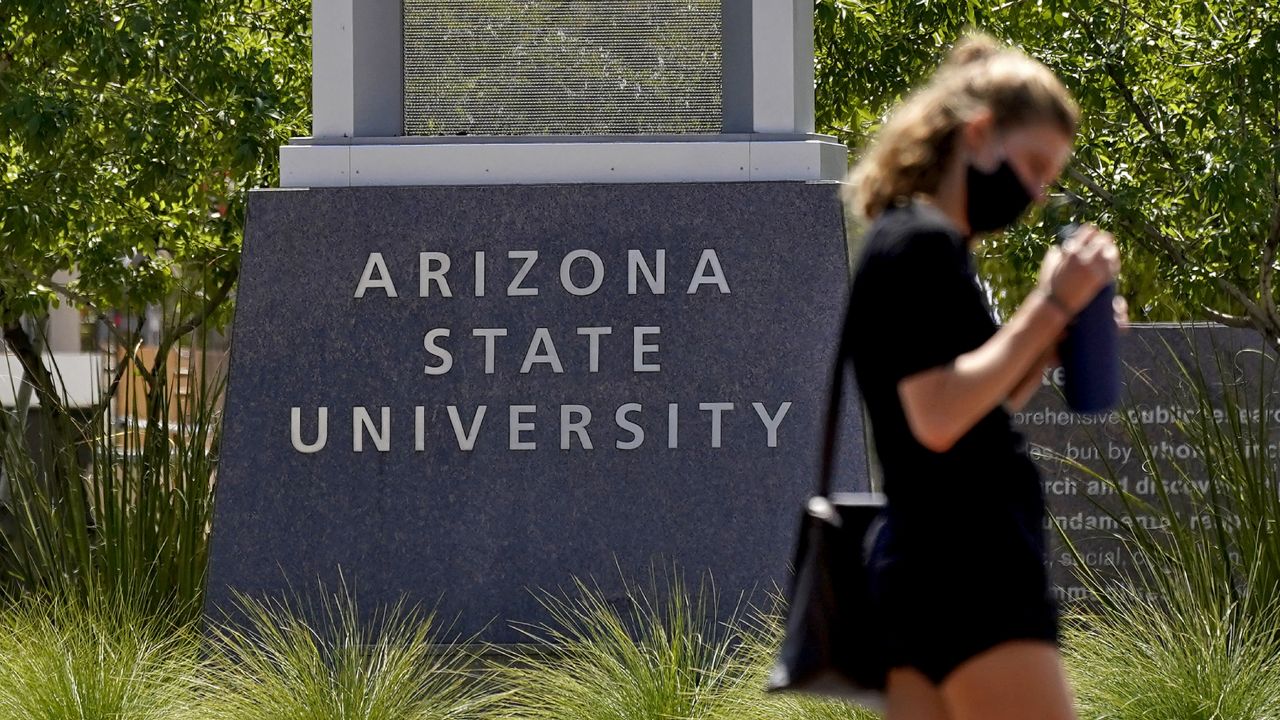In mid-March, Rutgers University became one of the first major schools in the U.S. to announce they would require all on-campus students to be fully vaccinated against COVID-19 before returning to class for the Fall semester.
Many schools followed suit — according to data compiled by Best Colleges, around 400 colleges and universities across the country now require students to get the vaccine before the coming school year.
The mandates have raised legal questions, both from state lawmakers and students themselves.
A number of governors have barred public education institutions from mandating COVID-19 vaccines. In mid-June, Arizona’s Republican Gov. Doug Ducey issued an executive order saying public universities and community colleges could not mandate students to take the COVID-19 vaccine or submit proof of having done so.
Arizona schools are also not allowed to mandate COVID-19 tests for students who are not vaccinated.
“The vaccine works, and we encourage Arizonans to take it. But it is a choice and we need to keep it that way,” Ducey wrote in a statement. “Public education is a public right, and taxpayers are paying for it. We need to make our public universities available for students to return to learning. They have already missed out on too much learning. From K-12 to higher education, Arizona is supporting in-person learning.”
The order came in direct response to Arizona State University’s announcement that unvaccinated students would be required to submit a daily health check, participate in twice-weekly COVID-19 tests and wear face coverings in all indoor and outdoor spaces on campus.
The university issued a statement soon after saying they would comply with the governor’s order, and that they would communicate additional “changes in protocols to the university community.”
Other public universities have similarly been forced to rethink COVID-19 requirements following pressure from state lawmakers.
In early May, Indiana University said it would require all students and employees to receive COVID-19 vaccinations for the fall semester and threatened to cancel class registrations and fire staff members who didn’t comply.
In late April, Indiana’s Republican-dominated House and Senate overwhelmingly approved a bill barring state or local governments from issuing or requiring COVID-19 vaccine “passports,” or proof of having received a COVID-19 vaccine.
After passage of the new provision — and amid growing protests of the stringent vaccination requirements — Indiana University modified its COVID-19 vaccination requirement, making it optional that students and employees provide proof of getting the shots.
IU said that under the revised requirement students and employees would be able to attest to their vaccination without having to provide immunization documentation as was required under the previous policy announced May 21.
“Requiring the COVID-19 vaccine for IU students, faculty and staff with appropriate exemptions continues the university’s comprehensive science and public health-driven approach to managing and mitigating the pandemic on our campuses,” IU President Michael McRobbie said in a statement. “Throughout the pandemic our paramount concern has been ensuring the health and safety of the IU community. This requirement will make a ‘return to normal’ a reality for the fall semester.”
But for some, those changes didn’t go far enough.
On Monday, a group of Indiana University students sued the school for requiring students to get a vaccine, saying the rule violates both the Fourteenth Amendment and the state’s recent Vaccine Passport Law.
“The threat of virtual expulsion from school for students who refuse to take the vaccine and who do not qualify for an exemption is not an attempt to garner consent — it is coercion,” court documents read in part. “In other contexts, even subtle, implied threats cannot constitutionally support ‘consent.’”
The question is not whether schools can mandate vaccinations for students — many require proof of vaccination against the measles, tetanus or hepatitis B.
The key question is whether schools can mandate a vaccine that is not fully authorized by the Food and Drug Administration.
All of the domestically-approved COVID-19 vaccines received emergency use authorization from the FDA, an approval given out to “unapproved medical products, or unapproved uses of approved medical products in an emergency to diagnose, treat, or prevent serious or life-threatening diseases or conditions when certain statutory criteria have been met, including that there are no adequate, approved, and available alternatives,” per the department.
Experts are split on whether the authorization status of the vaccines impacts schools’ ability to require students to get a COVID-19 vaccine, although the general consensus is that it does not.
Dorit Reiss, a professor of law at UC Hastings College of Law, Carmel Shachar, executive director of the Petrie-Flom Center for Health Law Policy, Biotechnology, and Bioethics at Harvard Law School and I. Glenn Cohen, deputy dean and a professor of law at Harvard Law School penned a joint opinion article in STAT News magazine saying there are “few to no legal barriers to employers or schools requiring vaccines being distributed under EUAs.”
“Without clear indications that requiring Covid-19 vaccination is legally forbidden, employers and universities should be allowed to do that — which isn’t to say a vaccine mandate is the right choice for a university or employer,” the article reads in part. “That is a more complex question that will depend on expectations of how many employees or students will get vaccinated without a mandate and the effect of mandates on vaccine hesitancy.”
But lawmakers in some states disagree. In mid-may, New York Gov. Andrew Cuomo said “You cannot mandate any of these vaccines yet, because they are all emergency-use authorization.”
“A state cannot mandate a vaccine that is authorized by emergency use,” he added. “It has to receive a full federal approval first.”
Cuomo said vaccinations would only be mandated for students attending in-person classes if the shots receive FDA approval before the beginning of the fall semester.
The Associated Press contributed to this report.



